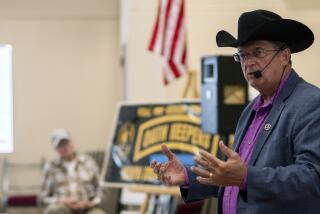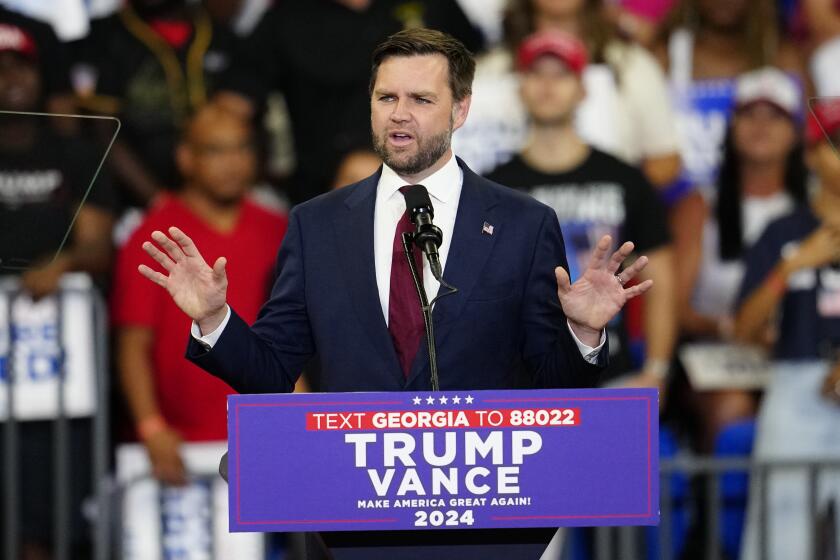Church court tries minister who performed same-sex marriages
A lesbian minister, who officiated at more than a dozen same-sex weddings during the brief window gay marriage was legal in California, goes to trial Thursday before a Presbyterian court, charged with violating her denomination’s constitution.
The case of the Rev. Jane Adams Spahr has gained national attention because “what is being tested is the definition of marriage” in the Presbyterian faith, said the Rev. Carmen Fowler, president of the Presbyterian Lay Committee, a conservative organization that opposes same-sex marriage.
Spahr’s trial, which will be held in Napa, begins less than three weeks after a federal court judge ruled that California’s ban on same-sex marriage is unconstitutional. And it underscores the awkward position in which changing civil law places many clergy members.
Although the Presbyterian constitution does not explicitly prohibit same-sex marriage, it defines marriage as “a civil contract between a woman and a man.” But same-sex marriage is legal in five states and the District of Columbia and is working its way through the courts in California.
“More and more ministers are going to be put in a position where their church members are going to come to them asking for a wedding, and they’re going to have to say yes,” said the Rev. Beverly Brewster, Spahr’s defense attorney. “Not to do so would violate many constitutional provisions about non-discrimination in pastoral care.”
The Presbyterian Church (USA) has more than 2 million members. Along with other mainline Protestant churches, it has been grappling with the issue of homosexuality for decades.
In 1978, the church’s General Assembly issued an “authorized interpretation that said being gay and Christian was incompatible,” said Patrick Evans, an assistant professor at Yale Divinity School.
Then in 1996, the Presbyterian constitution was amended to require that ministers, deacons or elders in the church “live either in fidelity within the covenant of marriage between a man and a woman or chastity in singleness.”
In July, the General Assembly, which meets every two years, voted to repeal that requirement. Now the denomination’s 173 regions, or presbyteries, will have until June to vote on whether to ratify that change. The amendment is not believed to have been used against a straight minister and it effectively blocks the ordination of gay ministers who are in committed relationships.
The balloting will be the fifth time that efforts to ordain gay clergy have gone to such a vote.
Spahr was ordained in 1974, when she was the married mother of two young sons. The 68-year-old came out in 1978 and has fought for full inclusion of gays and lesbians in Presbyterian life ever since. She was able to remain a minister because she was ordained before the anti-gay edicts.
Spahr was executive director of what is now the Spectrum Center for Lesbian, Gay, Bisexual and Transgender Concerns in San Anselmo when she was offered a position in 1991 as co-pastor of a church in Rochester, N.Y. But 14 churches in that region filed complaints against her, the case went to trial, and Spahr lost. That same church then hired her to be an evangelist and she spent the next 14 years traveling the country and preaching.
Although the fight over whether gay men and lesbians could take the pulpit was at the heart of Spahr’s first trial, same-sex marriage has been the battleground for her second two trials in ecclesiastical court.
Spahr was tried in 2006 for officiating at the weddings of two lesbian couples in California. The Presbyterian church allows its ministers to bless same-sex unions, as long as the ceremonies do not mirror traditional marriages and are not represented as weddings.
But Spahr says, “as a matter of my conscience,” that she “cannot be a part of … people being seen as second class or less than. I have seen the violence it has done.”
So when she officiates, she says, the ceremony is a wedding and the result is a marriage. The 2006 case went to the Presbyterian church’s highest ecclesiastical court. Spahr, who retired in 2007, was acquitted on a technicality in April 2008.
Because gay marriage was not legal in California at the time, “the ceremonies that are the subject of this case were not marriages,” the high court said, adding that Spahr had been found guilty by a lower church court “of doing that which by definition cannot be done.”
She was also warned to cease and desist. But two months after the high court ruling, marriage became legal in California — until the Proposition 8 ban passed. During that five months, Spahr figures, she married a score or more gay and lesbian couples.
“These are my friends, I loved them,” Spahr said in an interview. “Some of them, I had done their holy unions or commitment ceremonies before…. Some of these people, I’ve buried their family members, baptized their children. It’s such an amazing experience, just to see them, this equality, finally to hear, yes, marriages, our marriages!”
The first marriage was for Sara Taylor and Sherrie Holmes on June 20, 2008, at the Marin County Civic Center in San Rafael. It made the papers and the television news.
The Rev. Robert Conover, executive of the Presbytery of the Redwoods, eventually received a complaint that Spahr had married the two women. The filing included a newspaper story and a certified copy of the marriage certificate signed by Spahr. The accuser has chosen to remain anonymous.
A church committee investigated the accusation and decided to bring charges against Spahr.
“Essentially, what we have is no wiggle room,” said JoAn Blackstone, who is prosecuting the case on behalf of the church. “It wasn’t just a one-time situation but a continuing disregard of the rule of the church.”
Blackstone said she considers Spahr’s case a very narrow one and does not plan to argue “the merits or lack thereof of marriage between people of the same gender.”
Brewster, however, has other ideas. Eleven couples married by Spahr will testify, Brewster said, along with an expert witness who will seek to show that Scriptures most often quoted by “anti-marriage equality people are being misused, misinterpreted.”
If found guilty, Spahr faces censure that could include being defrocked. But the San Francisco resident, who lives with her son and granddaughter, does not think such punishment is likely.
She sees the trial as “a tremendous opportunity to invite the church to become open, to listen to the stories of these amazing couples,” she said. “I hope that more hearts and minds are opened.”
maria.laganga@latimes.com
More to Read
Sign up for Essential California
The most important California stories and recommendations in your inbox every morning.
You may occasionally receive promotional content from the Los Angeles Times.











